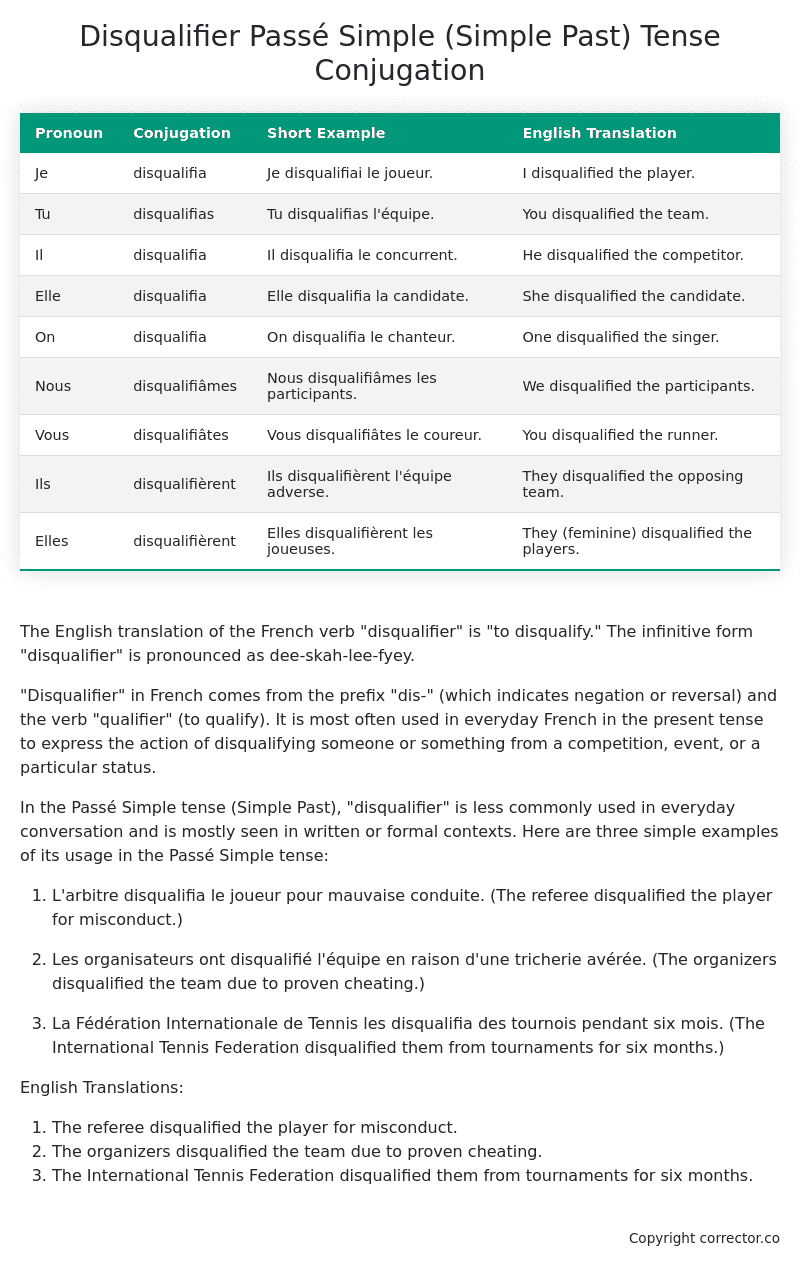Passé Simple (Simple Past) Tense Conjugation of the French Verb disqualifier
Introduction to the verb disqualifier
The English translation of the French verb “disqualifier” is “to disqualify.” The infinitive form “disqualifier” is pronounced as dee-skah-lee-fyey.
“Disqualifier” in French comes from the prefix “dis-” (which indicates negation or reversal) and the verb “qualifier” (to qualify). It is most often used in everyday French in the present tense to express the action of disqualifying someone or something from a competition, event, or a particular status.
In the Passé Simple tense (Simple Past), “disqualifier” is less commonly used in everyday conversation and is mostly seen in written or formal contexts. Here are three simple examples of its usage in the Passé Simple tense:
-
L’arbitre disqualifia le joueur pour mauvaise conduite.
(The referee disqualified the player for misconduct.) -
Les organisateurs ont disqualifié l’équipe en raison d’une tricherie avérée.
(The organizers disqualified the team due to proven cheating.) -
La Fédération Internationale de Tennis les disqualifia des tournois pendant six mois.
(The International Tennis Federation disqualified them from tournaments for six months.)
English Translations:
- The referee disqualified the player for misconduct.
- The organizers disqualified the team due to proven cheating.
- The International Tennis Federation disqualified them from tournaments for six months.
Table of the Passé Simple (Simple Past) Tense Conjugation of disqualifier
| Pronoun | Conjugation | Short Example | English Translation |
|---|---|---|---|
| Je | disqualifia | Je disqualifiai le joueur. | I disqualified the player. |
| Tu | disqualifias | Tu disqualifias l’équipe. | You disqualified the team. |
| Il | disqualifia | Il disqualifia le concurrent. | He disqualified the competitor. |
| Elle | disqualifia | Elle disqualifia la candidate. | She disqualified the candidate. |
| On | disqualifia | On disqualifia le chanteur. | One disqualified the singer. |
| Nous | disqualifiâmes | Nous disqualifiâmes les participants. | We disqualified the participants. |
| Vous | disqualifiâtes | Vous disqualifiâtes le coureur. | You disqualified the runner. |
| Ils | disqualifièrent | Ils disqualifièrent l’équipe adverse. | They disqualified the opposing team. |
| Elles | disqualifièrent | Elles disqualifièrent les joueuses. | They (feminine) disqualified the players. |
Other Conjugations for Disqualifier.
Le Present (Present Tense) Conjugation of the French Verb disqualifier
Imparfait (Imperfect) Tense Conjugation of the French Verb disqualifier
Passé Simple (Simple Past) Tense Conjugation of the French Verb disqualifier (You’re reading it right now!)
Passé Composé (Present Perfect) Tense Conjugation of the French Verb disqualifier
Futur Simple (Simple Future) Tense Conjugation of the French Verb disqualifier
Futur Proche (Near Future) Tense Conjugation of the French Verb disqualifier
Plus-que-parfait (Pluperfect) Tense Conjugation of the French Verb disqualifier
Passé Antérieur (Past Anterior) Tense Conjugation of the French Verb disqualifier
Futur Antérieur (Future Anterior) Tense Conjugation of the French Verb disqualifier
Subjonctif Présent (Subjunctive Present) Tense Conjugation of the French Verb disqualifier
Subjonctif Passé (Subjunctive Past) Tense Conjugation of the French Verb disqualifier
Subjonctif Imparfait (Subjunctive Imperfect) Tense Conjugation of the French Verb disqualifier
Conditionnel Présent (Conditional Present) Tense Conjugation of the French Verb disqualifier
Conditionnel Passé (Conditional Past) Tense Conjugation of the French Verb disqualifier
Conditionnel Passé II (Conditional Past II) Tense Conjugation of the French Verb disqualifier
L’impératif Présent (Imperative Present) Tense Conjugation of the French Verb disqualifier
L’impératif Passé (Imperative Past) Tense Conjugation of the French Verb disqualifier
L’infinitif Présent (Infinitive Present) Tense Conjugation of the French Verb disqualifier
L’infinitif Passé (Infinitive Past) Tense Conjugation of the French Verb disqualifier
Le Participe Présent (Present Participle) Tense Conjugation of the French Verb disqualifier
Le Participe Passé (Past Participle) Tense Conjugation of the French Verb disqualifier
Struggling with French verbs or the language in general? Why not use our free French Grammar Checker – no registration required!
Get a FREE Download Study Sheet of this Conjugation 🔥
Simply right click the image below, click “save image” and get your free reference for the disqualifier Passé Simple tense conjugation!

Disqualifier – About the French Passé Simple (Simple Past) Tense
Formation
Usage
Narration
Historical Context
Interactions with other tenses
Passé Composé
Imparfait
Conditional and Subjunctive
Summary
I hope you enjoyed this article on the verb disqualifier. Still in a learning mood? Check out another TOTALLY random French verb conjugation!


